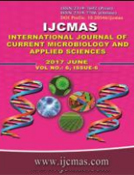


 National Academy of Agricultural Sciences (NAAS)
National Academy of Agricultural Sciences (NAAS)

|
PRINT ISSN : 2319-7692
Online ISSN : 2319-7706 Issues : 12 per year Publisher : Excellent Publishers Email : editorijcmas@gmail.com / submit@ijcmas.com Editor-in-chief: Dr.M.Prakash Index Copernicus ICV 2018: 95.39 NAAS RATING 2020: 5.38 |
Aim of the study is analyse the inheritance of seed yield and its contributing traits through combining ability analysis in field pea for this seven genotypes as parents viz., Makyatmubi, Makuchabi, KPMR-851, Prakash, Pant P-217, Rachna and VL-5 in diallel without reciprocals during Rabi 2013-14 were selected. The genetic analysis was carried out following Griffing’s Method II with Model I (1956) for twelve quantitative characters. The ANOVA for combining ability revealed highly significant differences among crosses for all the characters studied. The σ2GCA/σ2SCA ratio was shown to be less than unity for most of the character indicating the predominant role of non-additive gene action in the inheritance of those traits. However, for remaining traits days to first flowering, number of nods to first flowering, number of seeds per pod and 100 seed weight, the ratio was found to be more equal to unity indicating the importance of both additive and non-additive gene action in the expression of these gene. In case of GCA effects, Makyatmubi and Makuchabi were identified as the most promising parents for involving in hybridization programme. On the basis of SCA effects, two crosses viz., Makyatmubi x KPMR-851 and Makuchabi x VL-58 were identified as the most promising crosses for improvement of seed yield per plant viz., number of pods/plant, number of seeds/pod, etc. These crosses showing highly significant SCA effects for seed yield per plant also exhibited high per se performance and moreover both the parents involved either as good general combiner or at least one good combiner for seed yield per plant. The manifestation of heterosis for seed yield was evidenced by superiority of hybrids ranging from 42.28 to 192.48% in 19 crosses over standard check variety Rachna. Overall on the basis of results of mean performance, including GCA and SCA effects and standard heterosis, three crosses viz., Makyatmubi x KPMR-851, Makuchabi x VL-58 and Makuchabi x Prakash were identified as the most promising cross combinations for improvement of seed yield and its component traits in pea.
 |
 |
 |
 |
 |